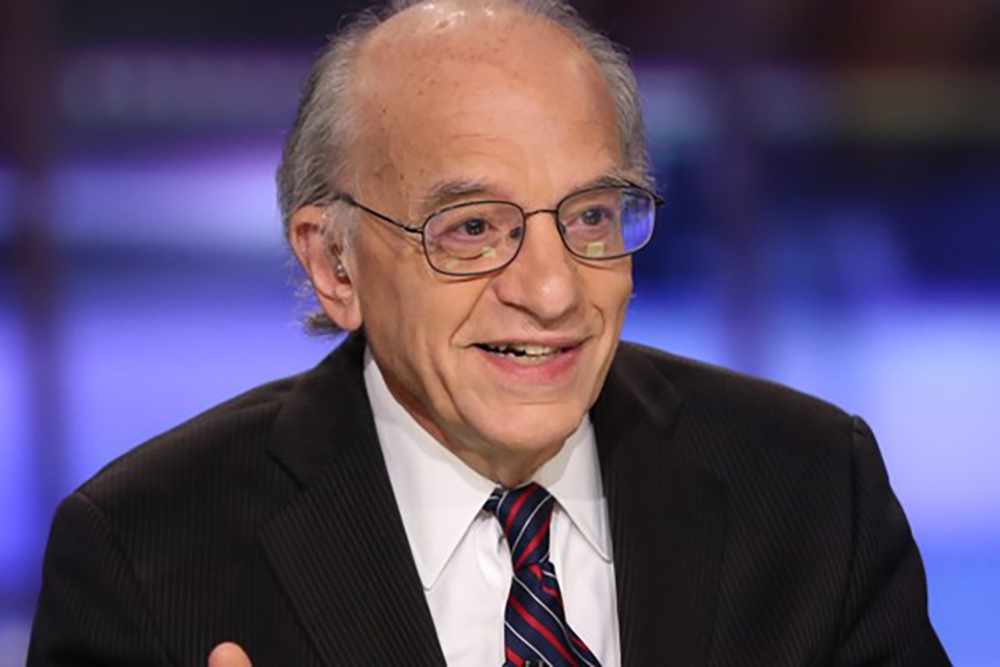
过去几周,美国债务违约的可能性一直令华尔街惶恐不安。投资者担心,面对华盛顿的政治僵局,提高债务上限的协议可能难以达成。令人担心的是,众议院的许多共和党议员似乎对于危机的严重性嗤之以鼻,而对于财政部长珍妮特·耶伦发出的关于美国债务违约的X日的末日警告,他们嘲讽她是在靠“通灵板”占卜。但沃顿商学院(Wharton)教授杰里米·西格尔却并不担心。这位资深市场观察家曾经见证过数十次类似的情况,他依旧相信议员们能够达成协议。
他在本周的WisdomTree评论文章中写道:“美国债务危机得不到解决的可能性为零,尽管可能到最后一分钟之前,双方都会相互表态和辩论,但最终他们会延长债务偿还期限或者提高债务上限。”
自从今年1月美国政府达到31.4万亿美元的国家债务上限以来,美国财长耶伦一直在利用“非常措施”维持政府运行。她还多次警告如果超过提高债务上限的最终期限,美国将面临“经济和财政崩溃”。耶伦表示这个最终日期最早是在6月1日,但高盛(Goldman Sachs)估计真正的X日是在6月中旬以后。
当然,并非只有沃伦在担心债务上限危机的影响。美国许多经济学家认为,债务违约将对美国经济造成灾难性后果,如穆迪分析(Moody’s Analytics)在1月估计,如果发生经济衰退,造成严重失业,将使美国家庭的财富缩水12万亿美元,这“相当于全球金融危机期间美国家庭蒙受的损失”。
虽然自1960年以来,美国已经78次提高或修改债务上限,但最近这次债务上限危机即使不是史上最严重的一次,也是最严重的危机之一。瑞银全球财富管理(UBS Global Wealth Management)美洲首席投资官索立塔·马尔切利在最近的一份研究报告中解释称“当前与债务上限辩论有关的风险,公认高于自2011年以来的任何年份”,在2011年,直到X日前两天,立法者才就提高债务上限达成协议。
马尔切利和华尔街的许多分析师依旧相信,政府能够及时提高债务上限。她写道:“经过最近几周数次言辞激烈的交锋之后,两党已经坐到了谈判桌上,并且似乎确实都有意避免一场财政灾难。”
沃顿商学院教授西格尔认为,归根结底这还是一个政治问题,而且议员不希望让人们认为他们是愚蠢的,最终“会又一次有权宜之计”,在最后一刻提高债务上限。
他在上周发表的Wisdom Tree评论文章中写道:“我认为在某些方面,民主党人感受到了满足共和党人要求的压力。我认为,如果他们做出妥协,这对于民主党人而言在政治上是一个很好的结果。如果共和党人能实现一半的目的,就可以视为是一场胜利。”共和党一直在推动减少开支,以及加强医疗补助和其他联邦补助项目的工作要求等,但民主党却表示这“毫无希望”,而白宫却寻求对富人和大公司加税,但在支出方面绝不让步。
财富管理公司Key Private Bank的首席投资官乔治·马特约也认为议员最终能够达成协议。该公司管理的资产规模超过500亿美元。
马特约对《财富》杂志表示:“债务上限问题会得到解决。但近期会有更多市场波动。”马特约提到了2011年,当时由于提高债务上限的协议几乎无法达成,市场出现了一些动荡,但最终“市场恢复了上行趋势,并且几乎一路上涨。”
财富管理公司Bahnsen Group的首席投资官大卫·巴恩森对《财富》杂志称“达成债务上限协议是必然的。”
他说道:“每一位市场参与者都清楚这一点。唯一的问题是短期交易者会在达成协议的过程中经历波动,我们将这种波动称为噪音。我们向投资者发出的主要信息是,不要理会与债务上限有关的噪音,要关注能够增加现金流的投资,而有持续增发股息这一传统的公司基本上都符合这个条件。”(财富中文网)
翻译:刘进龙
审校:汪皓
2014年,宾夕法尼亚大学沃顿商学院金融学教授杰里米·西格尔。
过去几周,美国债务违约的可能性一直令华尔街惶恐不安。投资者担心,面对华盛顿的政治僵局,提高债务上限的协议可能难以达成。令人担心的是,众议院的许多共和党议员似乎对于危机的严重性嗤之以鼻,而对于财政部长珍妮特·耶伦发出的关于美国债务违约的X日的末日警告,他们嘲讽她是在靠“通灵板”占卜。但沃顿商学院(Wharton)教授杰里米·西格尔却并不担心。这位资深市场观察家曾经见证过数十次类似的情况,他依旧相信议员们能够达成协议。
他在本周的WisdomTree评论文章中写道:“美国债务危机得不到解决的可能性为零,尽管可能到最后一分钟之前,双方都会相互表态和辩论,但最终他们会延长债务偿还期限或者提高债务上限。”
自从今年1月美国政府达到31.4万亿美元的国家债务上限以来,美国财长耶伦一直在利用“非常措施”维持政府运行。她还多次警告如果超过提高债务上限的最终期限,美国将面临“经济和财政崩溃”。耶伦表示这个最终日期最早是在6月1日,但高盛(Goldman Sachs)估计真正的X日是在6月中旬以后。
当然,并非只有沃伦在担心债务上限危机的影响。美国许多经济学家认为,债务违约将对美国经济造成灾难性后果,如穆迪分析(Moody’s Analytics)在1月估计,如果发生经济衰退,造成严重失业,将使美国家庭的财富缩水12万亿美元,这“相当于全球金融危机期间美国家庭蒙受的损失”。
虽然自1960年以来,美国已经78次提高或修改债务上限,但最近这次债务上限危机即使不是史上最严重的一次,也是最严重的危机之一。瑞银全球财富管理(UBS Global Wealth Management)美洲首席投资官索立塔·马尔切利在最近的一份研究报告中解释称“当前与债务上限辩论有关的风险,公认高于自2011年以来的任何年份”,在2011年,直到X日前两天,立法者才就提高债务上限达成协议。
马尔切利和华尔街的许多分析师依旧相信,政府能够及时提高债务上限。她写道:“经过最近几周数次言辞激烈的交锋之后,两党已经坐到了谈判桌上,并且似乎确实都有意避免一场财政灾难。”
沃顿商学院教授西格尔认为,归根结底这还是一个政治问题,而且议员不希望让人们认为他们是愚蠢的,最终“会又一次有权宜之计”,在最后一刻提高债务上限。
他在上周发表的Wisdom Tree评论文章中写道:“我认为在某些方面,民主党人感受到了满足共和党人要求的压力。我认为,如果他们做出妥协,这对于民主党人而言在政治上是一个很好的结果。如果共和党人能实现一半的目的,就可以视为是一场胜利。”共和党一直在推动减少开支,以及加强医疗补助和其他联邦补助项目的工作要求等,但民主党却表示这“毫无希望”,而白宫却寻求对富人和大公司加税,但在支出方面绝不让步。
财富管理公司Key Private Bank的首席投资官乔治·马特约也认为议员最终能够达成协议。该公司管理的资产规模超过500亿美元。
马特约对《财富》杂志表示:“债务上限问题会得到解决。但近期会有更多市场波动。”马特约提到了2011年,当时由于提高债务上限的协议几乎无法达成,市场出现了一些动荡,但最终“市场恢复了上行趋势,并且几乎一路上涨。”
财富管理公司Bahnsen Group的首席投资官大卫·巴恩森对《财富》杂志称“达成债务上限协议是必然的。”
他说道:“每一位市场参与者都清楚这一点。唯一的问题是短期交易者会在达成协议的过程中经历波动,我们将这种波动称为噪音。我们向投资者发出的主要信息是,不要理会与债务上限有关的噪音,要关注能够增加现金流的投资,而有持续增发股息这一传统的公司基本上都符合这个条件。”(财富中文网)
翻译:刘进龙
审校:汪皓
Wall Street has been wobbling under the weight of a potential U.S. debt default over the past few weeks. Investors are concerned that a deal to raise the debt ceiling could be hard to come by amid political gridlock in Washington. Worryingly, many House GOP members seem to be laughing off the seriousness of the threat, mocking Treasury Secretary Janet Yellen’s apocalyptic warnings of crossing the X-date, when the U.S. will default, as something from a “Ouija board.” But Wharton professor Jeremy Siegel isn’t concerned. The veteran market watcher has seen this dozens of times before and continues to believe lawmakers will come to an agreement.
“There is zero chance the debt issue will not get resolved even though there will be posturing and debate right up to the last minute before timelines are extended or the debt limit is raised,” Siegel wrote in his WisdomTree commentary this week.
Treasury Secretary Yellen has been using “extraordinary measures” to keep the government running since hitting the $31.4 trillion national debt ceiling in January. She’s also repeatedly warned the U.S. faces “economic and financial collapse” if the deadline to increase the debt ceiling passes. That could be as soon as June 1, according to Yellen, but Goldman Sachs estimates the true X-date won’t be until mid-June.
Yellen isn’t the only one worried about the fallout from the debt ceiling drama, of course. Economists across the nation have argued that a debt default could have disastrous consequences for the U.S. economy, with Moody’s Analytics estimating in January that it could wipe out $12 trillion in household wealth in a job-killing recession that would be “comparable to that suffered during the global financial crisis.”
Even though the debt ceiling has been raised or altered 78 times since 1960, this latest debt ceiling crisis is one of if not the worst in history. Solita Marcelli, chief investment officer of the Americas at UBS Global Wealth Management, explained in a recent research note that “the risks associated with the debt ceiling debate are admittedly higher today than at any time since 2011” when it took until just two days before the X-date for lawmakers to agree to raise the debt ceiling.
Still, Marcelli, and most Wall Streeters, continue to believe the debt ceiling will be raised in time. “After some acrimonious exchanges in recent weeks, both political parties have arrived at the negotiating table and appear genuinely interested in avoiding a fiscal calamity,” she wrote.
Wharton’s Siegel believes it all comes down to politics, and lawmakers don’t want to look foolish, which ultimately will lead to “another kick the can down the road measure” to extend the debt ceiling at the last minute.
“I believe Democrats feel pressured to meet the Republicans in some way. I think if they met them halfway, that is a good political position for the Democrats. If the Republicans get half of what they want, it can be regarded as a victory,” he wrote in his Wisdom Tree commentary last week. Republicans have been pushing for the typical spending cuts, in addition to work requirements for Medicaid and other federal assistance programs, which Democrats have called a “nonstarter,” while the White House is seeking tax increases for the wealthy and some large companies while holding the line on spending.
George Mateyo, chief investment officer at Key Private Bank, a wealth manager with over $50 billion in assets under management, also believes lawmakers will ultimately come to an agreement.
“The debt ceiling issue will get resolved,” he told Fortune. “But there’s going to be some more market volatility in the near term.” Mateyo pointed to 2011, where markets faced some pain as the debt ceiling came close to not being raised, but eventually “resumed an upward trend and almost never looked back.”
David Bahnsen, chief investment officer of wealth management firm the Bahnsen Group, told Fortune “a debt ceiling deal is a certainty.”
“Every market actor knows it,” he said. “The only issue along the way is short-term traders playing the ebbs and flows of the process, and we call that noise. Our main message to investors is to ignore the debt ceiling noise and pursue investments that provide growing cash flows, which largely coincide with companies that have a long history of growing their dividends.”






